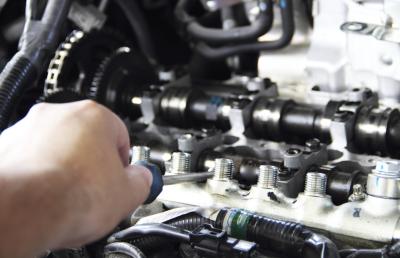
The 5.4-liter Triton is one of Ford Motor Company’s larger and more dependable V-8 engines. The 5.4-liter is available in the Ford F150, F250 and F350 pickups, as well as the Expedition sports utility vehicle. While the engine is one of the best Ford has ever engineered, based on warranty repair numbers, it does require care and proper maintenance, like all engines. The 5.4-liter is prone to three different types of abnormal engine noise.
Use professional quality oil filters. While purchasing economy oil filters may save a few dollars, you will be greeted on cold starts by a rattling noise that continues until the engine reaches operating temperature. All oil filters are not made the same. If you were to dissect quality oil filters, such as a MotorCraft, Wix or the Napa Gold Line model, you would see an anti-flowback valve installed within the filter. The purpose of this valve is to keep the oil in the engine’s top end after the engine is shut down. By doing so, the valve train is lubricated instantly at start up, instead of seconds later after the oil pump has circulated the oil from the oil pan to the top of the engine. Dissect a cheap oil filter and essentially what you will find is a filter medium akin to a coffee filter, wadded inside a tin can. If you notice the ticking sound on start up, make sure to change your oil as soon as possible and use a good-quality oil filter.
Protect the engine with the factory-recommended-weight oil to keep valve ticking noises at bay. Your 5.4-liter left the factory with 5W-20 or 5W-30 semi-synthetic oil in the engine. Use of thicker oils, such as 10W-30 or 20W-50, no matter the climate, can overwork the engine’s top end as it attempts to work with the thicker oil coursing through it. Once you have installed the thicker oil, you will most likely experience a ticking noise that does not dissipate when the engine reaches operating temperature. The longer the engine is operated with the wrong oil, the louder the noise will get. The synchronizer, which controls the timing for the top end, will ultimately become damaged and need to be replaced. As soon as you discover this ticking noise and know you have used the thicker oils, have the oil replaced immediately with the recommended weight.
In the unlikely event your 5.4-liter suffers from this next noise, be prepared to spend anywhere from $200 to $5,000 to have it repaired by a qualified technician. Worst-case scenarios on high-mileage engines translate to full engine replacement. In extremely rare cases, the 5.4-liter and its 6.8L V-10 cousin can have a spark plug “spit” out of the cylinder head. This is usually accompanied by a loud bang and a hammering noise that beats in rhythm with the engine. If this happens to you, have your truck towed to the nearest qualified repair facility for repairs. Attempting to drive it in this state can lead to an under-hood fire.
In these cases, the threaded sleeve in the head loses its bond with the surrounding cylinder head material and shoots outward on a hard compression stroke, ejecting the threads, spark plug and coil-on-plug unit. Prior to 2009, Ford Motor Company expressly forbid dealership service departments from repairing the cylinder heads with a "helicoil," a common quick fix in the aftermarket, due to the potential for severe engine damage caused by the helicoil’s inability to dissipate heat in the same manner as the surrounding head material. However, Ford released a helicoil kit of its own in 2009, which transferred heat to the surrounding cylinder head in a proper fashion. Ask your service adviser for this repair step first, before authorizing any major repairs.